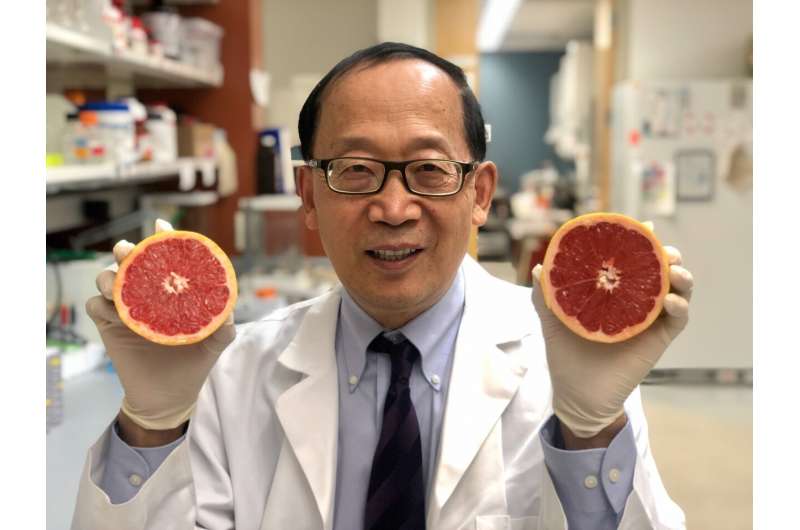Researcher uses fruit for less toxic drug delivery

University of Louisville researchers have found a less toxic way to deliver medicines by using the natural lipids in plants, particularly grapefruit and ginger.
The resulting intellectual property portfolio consisting of 12 patent families, invented by Huang-Ge Zhang, Ph.D., of UofL's James Graham Brown Cancer Center and Department of Microbiology and Immunology, has been licensed to Boston-based Senda BioSciences, a Flagship Pioneering company. UofL's technology is part of Senda's efforts to develop novel drug delivery platforms to solve the challenges of transferring therapeutics across biological barriers and throughout the body.
The UofL technologies use exosomes, which are very small fragments of living, edible plant cells, to transport various therapeutic agents, including anti-cancer drugs, DNA/RNA and proteins such as antibodies. These exosomes help ensure the drug is properly absorbed by the body.
Current practice is to use nanoparticles or liposomes made from synthetic materials to deliver these medicines. However, these materials are more expensive to produce in large quantities and can cause adverse health effects, such as cell toxicity and chronic inflammation. The UofL edible-plant-derived exosomes don't have these problems, Zhang said, since they come from natural, readily available sources. More importantly, these exosomes have anti-inflammatory effects.
"Our exosomes come from fruit or other edible plants—something good for you, that you buy in the grocery store and that humans have eaten forever," said Zhang, an endowed professor of microbiology and immunology who holds the Founders Chair in Cancer Research. "And, they don't require synthetic formulation."
The exosomes made from fruit lipids also can be modified to target and deliver medications to specific cell types within the body—like homing missiles, Zhang said. For example, the exosomes could be engineered to deliver a cancer therapeutic directly to cancer cells.
Zhang originally experimented with other fruits, including tomatoes and grapes. His epiphany came while eating a grapefruit—he realized his breakfast was chock-full of natural lipids that could be harvested to make exosomes at a larger scale. The results of that work later were published in multiple scientific journals, including Nature Communications, and Cell Host & Microbe, and now are exclusively licensed to Sen-da Biosciences.
"These technologies could make a real difference in drug delivery, improving access and costs while reducing side effects, " said Guillame Pfefer, CEO of Senda Biosciences. "We look forward to working with UofL to further develop these innovations and get them to market."
Senda Biosciences holds an exclusive license to several UofL fruit-based drug delivery technologies, including technologies focused on the regulation of gut microbiota, through the UofL Commercialization EPI-Center, which works with industry and startups to commercialize university technologies. The EPI-Center team worked closely with Zhang and Senda to develop and grow the partnership.
"This is the kind of outcome we want for all our technologies," said Holly Clark, Ph.D., deputy director of the Commercialization EPI-Center, who manages Zhang's intellectual property portfolio. "We've built a great working relationship between our innovator and our commercialization partner, Senda, and together, they will advance this suite of technologies for market."




















